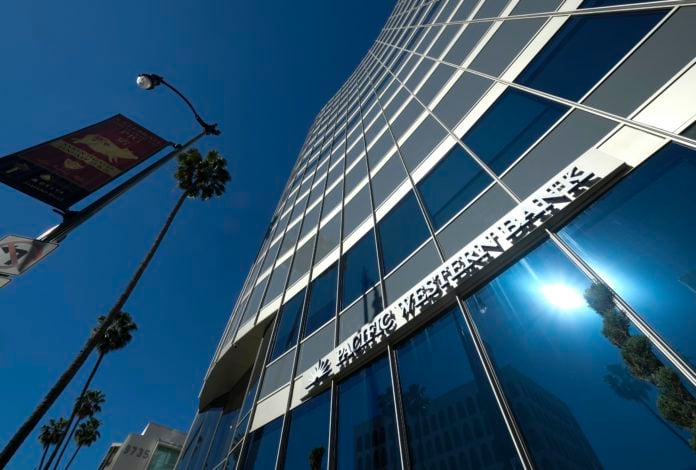It was only a few hours after Federal Reserve Chair Jerome Powell declared on Wednesday that officials had taken “an important step toward drawing a line under” the nation’s banking stress when a new stress was added – this time by L.A.’s PacWest Bancorp.
PacWest announced late Wednesday that it was reviewing strategic options and that it had been approached “by several potential partners and investors.” Its stock plunged 50% the next day and was down 86% since the start of the year.
PacWest, based in Beverly Hills, owns Pacific Western Bank. With $44.3 billion in loans and other assets, it is the third largest bank in the county. It has $28 billion in deposits and 67 branches, most of them in California.
Some regional banks that bear similarities to Silicon Valley Bank of Santa Clara, which failed in March, have sparked fear among investors and drawn the attention of short sellers, who profit when stock prices drop. PacWest has some exposure to technology companies, sustained paper losses on its investments and has a fairly large amount of deposits that exceed the federal insurance limits, all somewhat similar to Silicon Valley Bank. Additionally, PacWest has some loans in real estate, which is not a favored class now. And its stock has been a favorite among short sellers – reportedly as high as 25% of its shares last week.
PacWest last week said its uninsured deposits amount to about 25% of total deposits, which is far below Silicon Valley’s 94%, but apparently enough to make investors anxious. The level of uninsured deposits is important because those customers are prone to withdraw their money at any sign of trouble.
Late last month PacWest reported that it had lost $5 billion in deposits in the first quarter but that it had staunched the outflow and added more than $1 billion since March.
“The bank has not experienced out-of-the-ordinary deposit flows following the sale of First Republic Bank and other news,” PacWest said last week, referring to the rescue of that San Francisco bank last weekend by JPMorgan Chase. First Republic was the third regional bank to collapse in the last two months.
After that rescue, JPMorgan’s chief executive, Jamie Dimon, was quoted as saying that “this part of the crisis is over.”
And on Wednesday, the Fed chair agreed, making his comment about how a line had been drawn under the banking stress.
However, not only did PacWest show signs of stress soon thereafter, other regional banks did as well, including Western Alliance Bancorp of Phoenix and First Horizon Corp. of Memphis, Tennessee.

